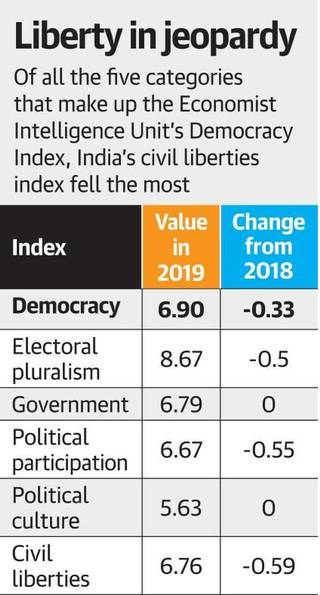Democracy Index: EIU | 23 Jan 2020
Why in News
India has slipped 10 places in the 2019 Democracy Index to 51st position. In 2018, India was ranked at 41.
- The Democracy Index (began in 2006) which is prepared by the Economist Intelligence Unit, provides a snapshot of the state of democracy worldwide in 165 independent states and two territories.
- The Economist Intelligence Unit is the research and analysis division of The Economist Group, which is the sister company to The Economist newspaper.
Democracy Index
- Based on five categories:
- Civil liberties,
- Electoral process and pluralism;
- Functioning of government;
- Political participation; and
- Political culture.
- The countries are scored on a scale of 0 to 10 on 60 indicators within the above categories.
- Based on their scores, each country is classified as one of four types of regimes:
- Full democracy (scores greater than 8);
- Flawed democracy (greater than 6 and up to 8);
- Hybrid regime (greater than 4 and up to 6); and
- Authoritarian regime (less than or equal to 4).
- Fall in Global Score
- The average global score has fallen from 5.48 in 2018 to 5.44 in 2019. This is the worst average global score since 2006.
- Cause: Driven by sharp regressions in Latin America and Sub-Saharan Africa, four out of the five categories that make up the global average score have deteriorated.
- There are only 22 “full democracies” as compared to 54 “authoritarian regimes” and as many “flawed democracies”.
- Almost one-half (48.4%) of the world’s population live in a democracy of some sort, although only 5.7% reside in a “full democracy”, down from 8.9% in 2015 as a result of the US being demoted from a “full democracy” to a “flawed democracy” in 2016.
- The total score of some 68 countries declined from 2018, but almost as many (65) recorded an improvement.
- Thailand registered the biggest improvement in score owing to an election in March 2019, which was the first since the military coup d’état in May 2014.
- China registered the greatest decline because of discrimination against minorities, especially in Xinjiang, and digital surveillance of the population.
India’s Performance
- Fall in Score: India’s score is down from from 7.23 in 2018 to 6.90 in 2019. This is the lowest score since 2006.
- Primary Cause: Erosion of civil liberties in the country. Specified examples include:
- Stripping of Jammu and Kashmir’s special status with the repeal of Articles 370 and 35A and the various security measures that followed the bifurcation of the state including restriction of Internet access.
- The exclusion of 1.9 million people from the final National Register of Citizens (NRC) in Assam and with the majority of people excluded being Muslims.
- On the Citizenship Amendment Act, the report said that the law has enraged the large muslim population, stoked communal tensions and generated large protests in major cities.
- Flawed Democracy: India’s score of 7.23 places it in the “flawed democracy” category i.e. countries that hold free and fair elections and where basic civil liberties are respected, but have significant weaknesses in aspects of democracy, such as problems in governance, an underdeveloped political culture and low levels of political participation.
- Comparison with Other Countries: In Asia and Australasia region, India ranks eighth, even behind countries like Taiwan and Timor-Leste.
- The United States, with a score of 7.96 that is just below the benchmark for a “full democracy”, is a “flawed democracy”, in the same category as India.
- Bangladesh (5.88) is in a “flawed democracy” category.
- Pakistan, with a score of 4.25, is categorised as a “hybrid democracy”;
- China (2.26) and North Korea (bottom-ranked with 1.08) are categorised as “authoritarian regimes”; and
- Norway (top-ranked with 9.87) is counted as a “full democracy”. Following Norway at the top of the rankings are Iceland (9.58), Sweden (9.39) and New Zealand (9.26). Other “full democracies” include Germany, the United Kingdom and France.
